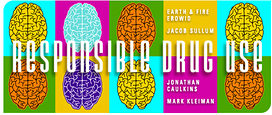To be justified, a law needs to be beneficial in its results — net of the costs of enforcement — and a reasonable restriction on liberty. Compared to a law that allowed individuals to grow their own cannabis for personal consumption or gratis distribution, the current cannabis laws probably have quite modest impacts on the level of cannabis abuse. Yet they make tens of millions of otherwise law-abiding citizens into lawbreakers, and subject hundreds of thousands of them to arrest each year. The vast bulk of the damage from cannabis abuse rests on the abusers; pot smokers aren’t noticeably violent or accident-prone, and the healthcare costs of their habit aren’t very heavy. Moreover, those health costs could be made much smaller by encouraging means of breathing cannabis vapors other than combustion of the plant matrix, for example by the use of vaporizers or nasal inhalers, both of them blocked by current law.
So Jon’s comparison of cannabis smoking with drunken driving seems to me as off-point as Jacob’s earlier comparison of those killed as a result of other people’s drinking with those killed as a result of their own driving or sexual activity.
The mere cultural prejudice of a majority of voters against the cannabis consumption of the minority does not, in my view, constitute sufficient justification for the costs imposed on that minority. The fact that millions of non-addicted pot-smokers keep right on smoking despite not only the laws but the arrests suggests to me, by the canons of revealed preference, that smoking pot is a practice that those people value, and that other people might value were they allowed to pursue it within the law. Their lost consumers’ surplus ought to count as a cost of the law, and I see no countervailing benefit of comparable magnitude. In addition, by banning a practice that poses little social risk, we waste enforcement resources and encourage disrespect for the law.
So I conclude that the ban on cannabis smoking — as opposed to cannabis commerce — cannot be justified, and that the majority in this instance acts wrongfully in restricting the liberty of the minority for no particular public purpose. That does not shake my conviction that allowing commercial marketing of cannabis along the lines currently permitted for alcohol would risk a very substantial increase in the level of abuse, as the legalization of the old “numbers game” led to the substantial prevalence of problem lottery gambling we now observe.
Therefore I favor non-commercial legalization as the ethically and practically appropriate approach to the most widely used illicit drug.

